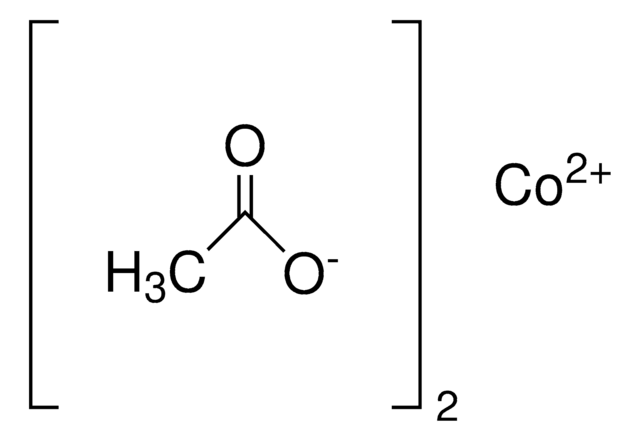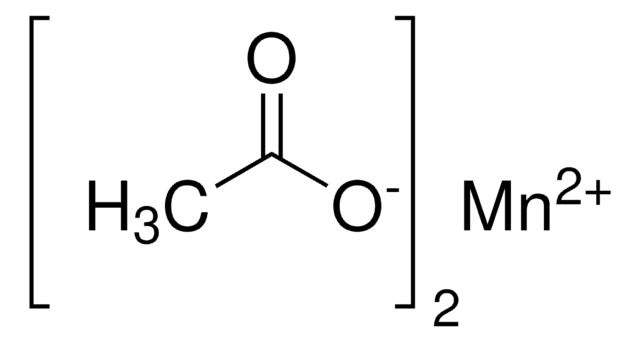72225
Nickel(II) acetate tetrahydrate
purum p.a., ≥99.0% (KT)
Synonym(s):
Acetic acid nickel(II) salt
About This Item
Recommended Products
grade
purum p.a.
Quality Level
Assay
≥99.0% (KT)
form
powder or crystals
reaction suitability
reagent type: catalyst
core: nickel
density
1.798 g/mL at 25 °C (lit.)
anion traces
chloride (Cl-): ≤50 mg/kg
cation traces
Ca: ≤50 mg/kg
Cd: ≤50 mg/kg
Co: ≤1000 mg/kg
Cu: ≤50 mg/kg
Fe: ≤50 mg/kg
K: ≤100 mg/kg
Na: ≤1000 mg/kg
Pb: ≤50 mg/kg
Zn: ≤50 mg/kg
application(s)
battery manufacturing
SMILES string
[H]O[H].[H]O[H].[H]O[H].[H]O[H].CC(=O)O[Ni]OC(C)=O
InChI
1S/2C2H4O2.Ni.4H2O/c2*1-2(3)4;;;;;/h2*1H3,(H,3,4);;4*1H2/q;;+2;;;;/p-2
InChI key
OINIXPNQKAZCRL-UHFFFAOYSA-L
Looking for similar products? Visit Product Comparison Guide
Application
Signal Word
Danger
Hazard Statements
Precautionary Statements
Hazard Classifications
Acute Tox. 4 Inhalation - Acute Tox. 4 Oral - Aquatic Acute 1 - Aquatic Chronic 1 - Carc. 1A - Muta. 2 - Repr. 1B - Resp. Sens. 1 - Skin Sens. 1 - STOT RE 1
Storage Class Code
6.1C - Combustible acute toxic Cat.3 / toxic compounds or compounds which causing chronic effects
WGK
WGK 3
Flash Point(F)
Not applicable
Flash Point(C)
Not applicable
Personal Protective Equipment
Choose from one of the most recent versions:
Already Own This Product?
Find documentation for the products that you have recently purchased in the Document Library.
Customers Also Viewed
Articles
Lithium-ion batteries represent a group of electrochemical devices used for electricity storage and have attracted a lot of attention in the past two decades due to their portability, rechargeability and low cost.
Plasmonic nanoparticles have unique optical properties that can be tailored to suit a variety of applications in the biotechnology1–8 and electronics9–16 industries.
Our team of scientists has experience in all areas of research including Life Science, Material Science, Chemical Synthesis, Chromatography, Analytical and many others.
Contact Technical Service













